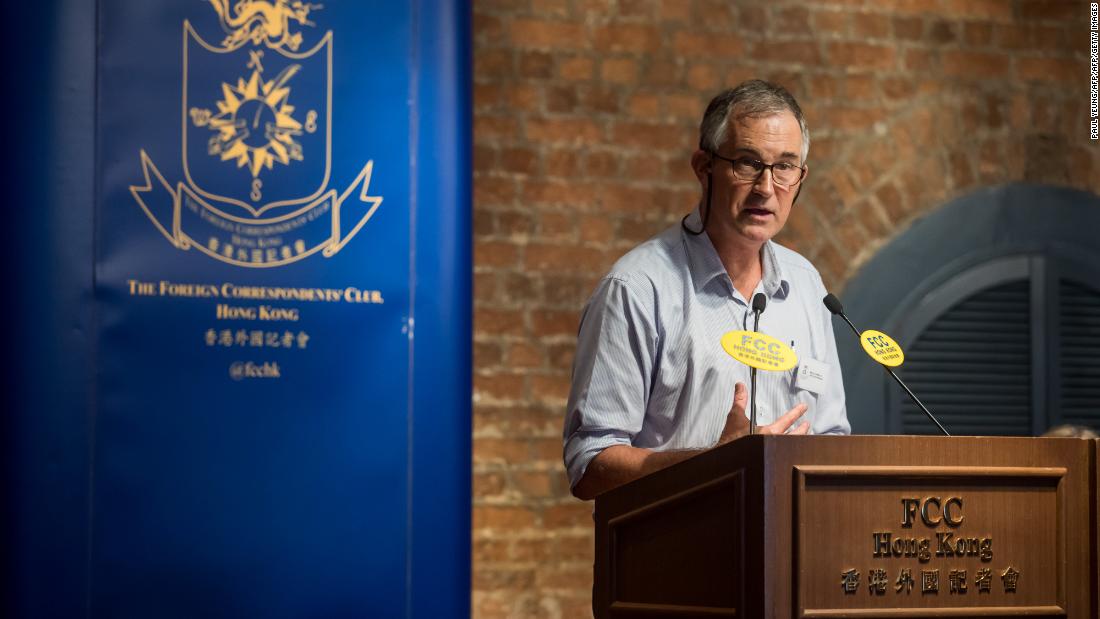
It says the decision "undermines Hong Kong's freedom of speech and freedom of the press."
Mallet was denied a routine extension of his work permit last month, and on Thursday he was denied entry on a tourist visa.
"At no point has any reason been given for the earlier refusal of his visa extension request nor this subsequent refusal of entry," the Foreign Office said.
The UK Minister of State for Asia, Mark Field, is due to arrive in Hong Kong on Friday and will raise the matter with ministers there as a matter of urgency.
Mallet was turned away at the border after several hours of questioning by immigration officers, the newspaper said, weeks after his working visa renewal was controversially refused.
Under current immigration rules, British nationals are typically allowed into Hong Kong without a visa, after which they are permitted to stay for 180 days.
Hong Kong's refusal to grant Mallet entry as a tourist effectively places him on a blacklist.
The Financial Times is currently appealing the earlier decision, which was widely seen as a response to Mallet hosting a talk by a pro-Hong Kong independence activist in his role as acting President of the Foreign Correspondents' Club.
Hong Kong Chief Executive Carrie Lam has said it was "pure speculation" to connect Mallet's expulsion with the August talk by Hong Kong National Party (HKNP) founder Andy Chan, whose organization was later banned.
"As a rule, not only locally, but internationally, we will never disclose, the Immigration Department will not disclose, the individual circumstances of the case or the considerations of his decision," she added.
When asked whether media organizations could face repercussions if they interviewed pro-independence figures in the future, Lam responded by referring to the Basic Law, Hong Kong's de facto constitution.
"Freedom of expression, freedom of reporting are core values in Hong Kong, and as the Chief Executive, I ... will safeguard all these rights as enshrined in the Basic Law," Lam said. "Every act, every case will be dealt with in accordance with the law, the policy and the circumstances, including the facts of the case."
Freedom of expression has been looking increasingly shaky in recent weeks, however. On Wednesday, Chinese dissident writer Ma Jian, who is based in London, said that an event he was due to speak at in the city had been canceled by the venue.
Ma was scheduled to host two talks Saturday at Tai Kwun, an art space that has received government funding, as part of the events of the Hong Kong International Literary Festival. Part of the talk was to focus on his new book, "China Dream." Those talks were initially canceled by Tai Kwun.
But on Friday, the venue announced it had reversed its decision and would now host Ma.
"Although we have been working with the Hong Kong International Literary Festival to secure a suitable alternative venue for Mr. Ma's talks, it is now clear that no alternative venue is available," Director of Tai Kwun Timothy Calnin said.
"At the same time, Mr. Ma has made public statements which clarify that his appearances in Hong Kong are as a novelist and that he has no intention to use Tai Kwun as a platform to promote his personal political interests
"With this in mind, as Director of Tai Kwun, I have decided to offer our venue for the two talks so that the events may continue to take place as planned. I would like to thank Tai Kwun supporters for their valuable opinions over the past few days and I would like to apologize for any inconvenience caused."
No comments:
Post a Comment